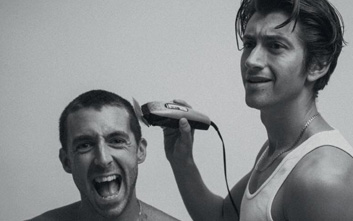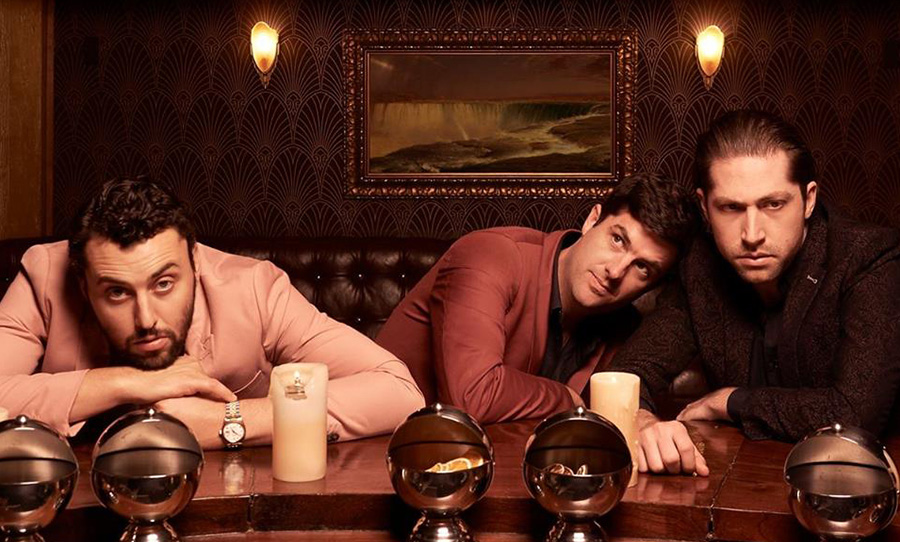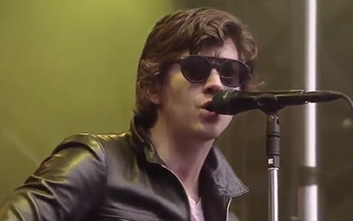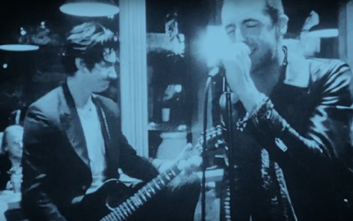Hold on – is this calendar accurate? How is this possible? How could eight years have crawled by so fast? Were it not for the rigours of modern timekeeping, I would refuse to believe it. The ceaseless torrent of fear, noise and grim tidings has made these last hard eight feel like an endless death march, a torrid struggle from second to second that would not, cannot, shall not yield to the sweetest pleas for mercy. Or maybe that was just for me. At any rate, it’s hard to believe that the better part of a decade has passed since first we heard from The Last Shadow Puppets. Yes kids, we were knee-deep and giddy in the heady days of 2008 when we first head tell from the dynamic pairing of Miles Kane and Alex Turner. A brisk rush of spy-guitar, strings and two-part harmony later, and we were left eagerly awaiting the next instalment in high-drama romance-rock. Well it took a little longer than expected, but here we are finally with Everything You’ve Come to Expect.
I was desperate to love this album. I am nothing if not a fanboy, and my love for the romantic sounds of yesteryear renders me markedly predisposed to music which races to the swells of Riviera strings. And certainly, the record does not lack for hearty chunks of loveworthy musicking. Most notable is its cohesive overall style and delivery, which adds a cinematic sheen to the distinctive blend of harmonised vocals, sweeping orchestral passages, and galloping midnight rock that was established on the band’s first record, The Age of the Understatement. Where that album’s sound was certainly daring, it was an (admittedly radical) extension of the silvery close-miked jangle found in Kane and Turner’s respective day jobs with the Rascals and Arctic Monkeys. This latest album darkens and deepens that sound, moving away (perhaps too far) from the more spaghetti-western elements of the debut to a sound that is decidedly more moody and bittersweet.
Everything is there, the style, the mood, the sonic prowess – so why is it that Everything You’ve Come To Expect is a lukewarm effort from the Last Shadow Puppets?
This transition benefits greatly from the duo’s development as vocalists. Turner in particular has become one of the most distinctive and interesting singers in modern pop, having honed his early plaintive, deadpan vocal style into a rich and powerful croon which easily rivals baritone greats like Nick Cave and Iggy Pop. Turner’s voice truly is amazing here, and while it’s hard to not occasionally miss the more earnest (and less cartoonish) persona of his earlier work, the stylised character that Turner now inhabits is a truly original transatlantic blend that will only become more interesting as his voice grows coarser and deeper with age. The standout tracks here for Turner are Miracle Aligner, which coasts breezily in the tender, breathy register that he has quietly developed over many Monkeys’ B-sides, and Sweet Dreams, TN, which is simply a stomping four-minute advertisement for the depth and flexibility of Turner’s voice.
That’s not to say that Kane doesn’t contribute a vital part. While I doubt I’ll ever pen for Kane the kind of embarrassing raves that you were subjected to above – he sticks a bit too close to a generic sub-Monkeys’ sneer for my tastes – on this record he hosts some of its best vocal moments. His slightly higher, more piercing, tone grants a welcome kick to opening track Aviation, and keeps Pattern from getting drowsy as he bounces off a springy rhythm section. He also sings lead on Bad Habits, easily the album’s strongest track. Over a gristly, throbbing groove, Kane yelps and snarls against the sinister interjections of a dissonant, dive-bombing string section, and the whole record jumps up a gear or three. It’s a real highlight for the omnipresent orchestra, which at its best, on tracks like Aviation and Dracula Teeth, lends the album a glamorous dose of old-Europe dissipation through thick swells and swivelling countermelodies.
But I must lodge a caveat. I wanted to love this album – and I did not. No matter how I wail and gnash, no matter how it tears at my heartstrings, I simply cannot force myself to call it remarkable. While the positives discussed are undeniable, it is my sad fanboy duty to report that the most of the expertly delivered tunes on offer here are underwritten and indistinct. Key here is the weakness of the melodies which, despite the singers’ abilities, rarely rise above a pleasant competence. The situation is not helped by the melody being near-constantly assigned two simultaneous lead vocalists, often in two-part-harmony. Yes, I know that’s a signature element of the band’s sound; the relentless pairing of not-quite-identical voices lent The Age of the Understatement a unique and thrilling energy.
However this album lacks the melodic highlights which offset the loss of clarity and expression which result from heavy vocal stacking, and further detail is lost by placing the vocals far further back in the mix than previously. This makes it a struggle to discern lyrics which already strike the ear strangely due to odd match-ups of syllables and melodic emphasis (eg. stressing ‘of’, ‘the’, and ‘it’ while awkwardly shoehorning admirable phrases like ‘sectoral heterochromia’ – for further examples see the work of Lou Reed).
Another key element underperforms here: the string section. While several moments throughout the record see the orchestral accompaniment lend vital weight and cinematic flavour, generally the strings are far less distinctively arranged than on the last outing. With the exception of the wonderful Bad Habits, they’re also far quieter in the mix, and thus less discernible melodically. They thus hew closer to their traditional pop function as a source of subtle atmospherics, leaving the spotlight to focus on compositions that cannot bear that level of scrutiny. Most of the tunes on this record seem to be missing some third element, maybe a bridge section, or a different instrumentation, and without it they hover awkwardly between graceful romanticism and strained, awkward structures.
They just don’t have the drive of the debut album – but I’m not putting on the rose-coloured shades here. Listening to their old stuff after hearing their latest, its startling to hear how callow the duo seems, possessed of a youthful timidity that somewhat undercuts their bold invention. I don’t yearn for a return to the past – rather this latest record has an aural confidence that I can only hope will soon be wedded to compositions of a similar calibre.
Maybe next time then. There’s no doubt as to the talent and inventiveness of the key players here, nor their continued desire and capacity to innovate within the field of pop-rock. That’s no small feat – we are well within the twilight stages of the classic post-war sound, and any artist who finds a spare corner of the canvas in which to make their mark should be encouraged and applauded. But unfortunately the boatloads of style here just haven’t got material to match.
Kane and Turner have clearly developed markedly as performers and now bear the individuality and confidence of the legit-grown men that they are, but for all its muscle and sheen, Everything You’ve Come To Expect simply can’t match the spark of their more youthful work. Let’s hope they stick with it though, and that the next offering combines combine the fizz of their first album with the punch of their second. But please, don’t make us wait another eight years for it.




